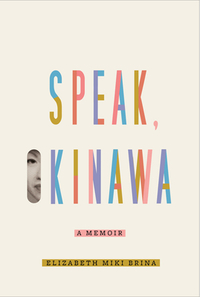Take a photo of a barcode or cover
Ooof, this is a heavy memoir to sit with.
The long and short of it is that being a child of immigrants in America is a very unique and at times confusing and conflicted experience, and I suspect that only kids of immigrants will understand Brina's examinations. They are honest and sometimes brutal. The daughter of an Okinawan mother and an American father, Brina has more than just her mixed race to contend with - there's a violent history that ultimately brought her parents together, and how to consider a marriage that came from conflict between countries? Because of this, Brina ties her family's story in with Okinawan history....I can't speak to accuracy, but I found the decision to tell that side of the story (a side that arguably isn't hers to tell) interesting. I understand the inclusion, as the historical conflict deeply affects her parents' relationship, but where does one draw the line when detailing a history from a personal perspective that they weren't born into? In some parts, she switches to the first person plural "we" when talking about the history, and while I love a good POV switch, I questioned the....intent? Idk.
Brina also speaks honestly about her own internalized racism, which is another complexity of growing up mixed race. As it is, children of immigrants often find themselves in a cultural tug-of-war between the American culture they're raised under and their parents' home culture. And America doesn't always easily allow one to claim multiple identities or cultures, so you're often left feeling like you have to choose one. Living in America with a white father and Asian mother, Brina gravitates more naturally toward her father, as he mirrors society around her (speaks English clearly and is generally more assimilated into American culture than her mother). This otherizing of her mother is hard to sit with, but Brina's acknowledgment of and coming to terms with it is kind of beautiful. Her profound realization that her mother's pronunciation of her American first name is no more "correct" or "incorrect" than her father's is a small but mighty decentering of whiteness and Americanness.
This memoir is about Brina, but also about her mother, and it really captures the isolation and hardship of the immigrant experience (not that it's a singular experience of course, but I suspect many would relate to this). An important read for understanding fully what it means to come to a country you don't know and make a whole life.
The long and short of it is that being a child of immigrants in America is a very unique and at times confusing and conflicted experience, and I suspect that only kids of immigrants will understand Brina's examinations. They are honest and sometimes brutal. The daughter of an Okinawan mother and an American father, Brina has more than just her mixed race to contend with - there's a violent history that ultimately brought her parents together, and how to consider a marriage that came from conflict between countries? Because of this, Brina ties her family's story in with Okinawan history....I can't speak to accuracy, but I found the decision to tell that side of the story (a side that arguably isn't hers to tell) interesting. I understand the inclusion, as the historical conflict deeply affects her parents' relationship, but where does one draw the line when detailing a history from a personal perspective that they weren't born into? In some parts, she switches to the first person plural "we" when talking about the history, and while I love a good POV switch, I questioned the....intent? Idk.
Brina also speaks honestly about her own internalized racism, which is another complexity of growing up mixed race. As it is, children of immigrants often find themselves in a cultural tug-of-war between the American culture they're raised under and their parents' home culture. And America doesn't always easily allow one to claim multiple identities or cultures, so you're often left feeling like you have to choose one. Living in America with a white father and Asian mother, Brina gravitates more naturally toward her father, as he mirrors society around her (speaks English clearly and is generally more assimilated into American culture than her mother). This otherizing of her mother is hard to sit with, but Brina's acknowledgment of and coming to terms with it is kind of beautiful. Her profound realization that her mother's pronunciation of her American first name is no more "correct" or "incorrect" than her father's is a small but mighty decentering of whiteness and Americanness.
This memoir is about Brina, but also about her mother, and it really captures the isolation and hardship of the immigrant experience (not that it's a singular experience of course, but I suspect many would relate to this). An important read for understanding fully what it means to come to a country you don't know and make a whole life.
emotional
hopeful
reflective
medium-paced
As a fellow hafu/Okinawan daughter of an Okinawan immigrant, this book spoke to me on such a personal level. I grew up knowing my mother and Bachan’s stories but this perspective gut punched me as it offered me a bowl of cut fruit. Great do immigrant daughters looking to understand their mothers and their sacrifices.
Graphic: Colonisation, War
Minor: Racism, Sexual violence
challenging
emotional
informative
inspiring
reflective
sad
medium-paced
5/5 ✨
Asian American author
a truly spectacular memoir
this memoir has so much depth, so much complexity. the author explores the history of Okinawa and of Asian immigrants to the U.S. and their connection to the relationship between her parents who met during the Vietnam war - her mother, a resident of Okinawa, and her father, a U.S. soldier stationed in Okinawa - who are still married to this day. Brina draws bridges between her parent’s relationship and her own relationship with her fiancé and eventually, how who her parents are shaped who she is and how she navigates the world
there is a level of honesty in this memoir that i’m not sure most of us are willing to explore within our own relationships. Brina connects her desire to achieve ‘whiteness’ to the shame she feels of her mother, and how this drives a wedge between them, Brina being unwilling to accept her mother for who she is. the vulnerability pierced me straight through the heart
read this important piece of literature
emotional
informative
reflective
sad
medium-paced
challenging
emotional
reflective
medium-paced
emotional
inspiring
reflective
medium-paced
emotional
reflective
medium-paced
emotional
hopeful
reflective
medium-paced
4.5 stars
"Sometimes, in real life, change can happen in an instant. This change, this epiphany of connection, that her trauma is my trauma, that our pain comes from the same source--this change is permanent. But sometimes, at first, it doesn't last. It goes away and comes back. Then goes away and comes back
Brina is the only child of an American soldier who "believes in the code of heroes, of men" & an Okinawan woman "born into poverty and chaos." Raised in the U.S. in white majority cities, she adored her father & felt very detached from her mother, her Okinawan culture & history. Despite being fairly privileged & entitled, Brina felt like an outsider. Her father didn't learn Japanese, her mother struggled with English. Brina didn't try to learn about Okinawa or make an effort to learn Japanese until she was in her thirties. It's taken her most of her life to realize that her mother must have felt like an outsider as well.
This book is not only her story, but her mother's, her father's, a story of their marriage with its power imbalance & flaws, its commitment & love. It is a story of the Okinawan people & the violence enacted upon them, their resilience & generosity.
A self reckoning, a cultural reckoning, a love letter & an apology. This book is many things, many stories & Brina has told them all with insight & great love. A really good book, brutally honest & beautifully written.
"But I must admit who half of me is, where half of me comes from: the long-standing tradition of conquest and absolution. Half of me was born with a sense of entitlement, a sense of the right to pursue happiness, to control and improve my life while taking for granted the resources and methods to do so, the mindset that if it doesn't work out it's not tough luck, it's a raw deal. Half of me is offended by the label of privilege, by the notion that there is no such thing as clean wealth, as pure good fortune. Half of me is afraid of accusation, of culpability, of guilt. Half of me uses the other half to maintain innocence. "
emotional
reflective
sad






